Glazed Lemon Blueberry Scones
Are you looking for a delicious pastry for a Tea Party or your next Sunday Brunch? Look no further than these delightful glazed lemon blueberry scones! Made with fresh or frozen blueberries, a hint of citrus and topped with glaze, these tasty treats are the perfect way to add some zing to your morning

Not only are these lemon blueberry scones a staple for a traditional tea, they are also one of my favorite recipes to serve for brunch.
They’re a nice alternative to muffins or sweet breads, if you’re looking for a little variety,
They’re easy to make and can be made ahead of time. Which is always a bonus if you’re having people over.
I like to freeze them before baking them. Then you can cook them just before serving and they’re fresh out of the oven when you serve them.
Adding the glaze is the perfect finishing touch. While it is optional (and they’re still good without it), I think most baking tastes a little better with frosting!
Ingredients
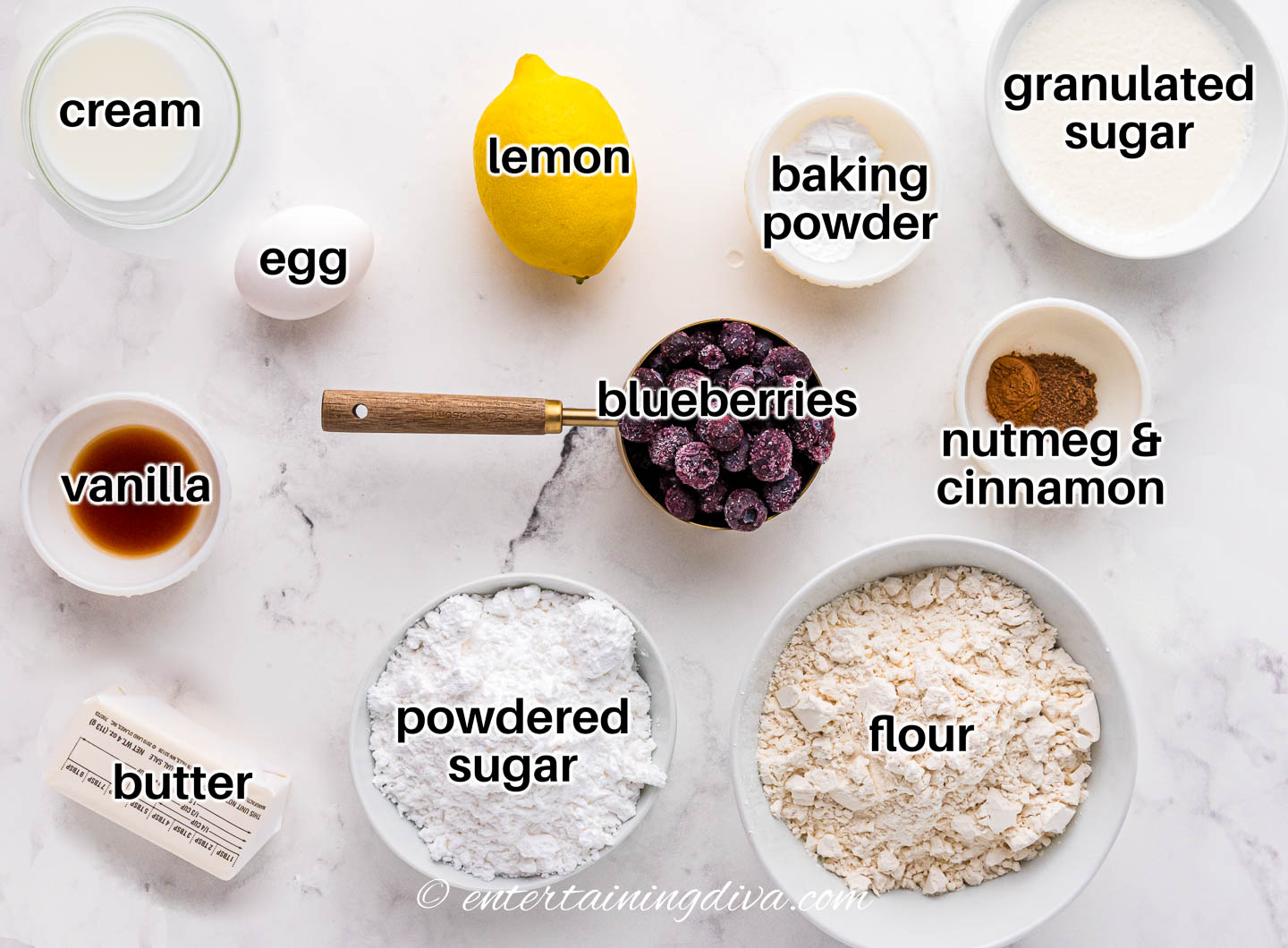
This recipe makes about 8 scones.
Here is your shopping list:
- Baking supplies: 2 cups all-purpose flour, 2½ teaspoons baking powder
- Sugar: ½ cup granulated sugar, 1 cup powdered sugar
- Spices: ½ teaspoon cinnamon, ½ teaspoon nutmeg
- Flavoring: 3 teaspoons vanilla
- Fresh produce: 1 lemon
- Fruit: 1 cup fresh or frozen blueberries. If you are using frozen blueberries, do not thaw them before putting them in the batter.
- Dairy: ½ cup salted butter, ½ cup plus 2 Tablespoons heavy cream.
- Eggs: 1 large egg
Substitutions
- If you don’t want to make the glaze, omit the powdered sugar, reduce the vanilla to 2 teaspoons and reduce the heavy cream to ½ cup.
- Substitute ½ cup buttermilk for ½ cup heavy cream in the scones if you prefer. I don’t recommend using regular milk since the fat in the cream gives the scones a better texture.
- For the glaze, you can replace the 2 Tablespoons heavy cream with 2 Tablespoons of milk.
- To give the glaze some extra lemon flavor, stir in 1 teaspoon of lemon zest.
How to make lemon blueberry scones With Lemon Glaze

Prep work
Put ½ cup butter in the freezer a couple of hours ahead of time to give it time to chill.
Using frozen butter will keep the scones from spreading too much in the oven and result in a lighter, fluffier pastry.
Putting the mixing bowl in the freezer ahead of time will also help to keep everything chilled.
Line a baking sheet with parchment paper or a Silpat. Or spray it with non-stick cooking spray.
Grate the skin of the lemon so you have enough for ½ Tablespoon of lemon zest.
Mix the dry ingredients
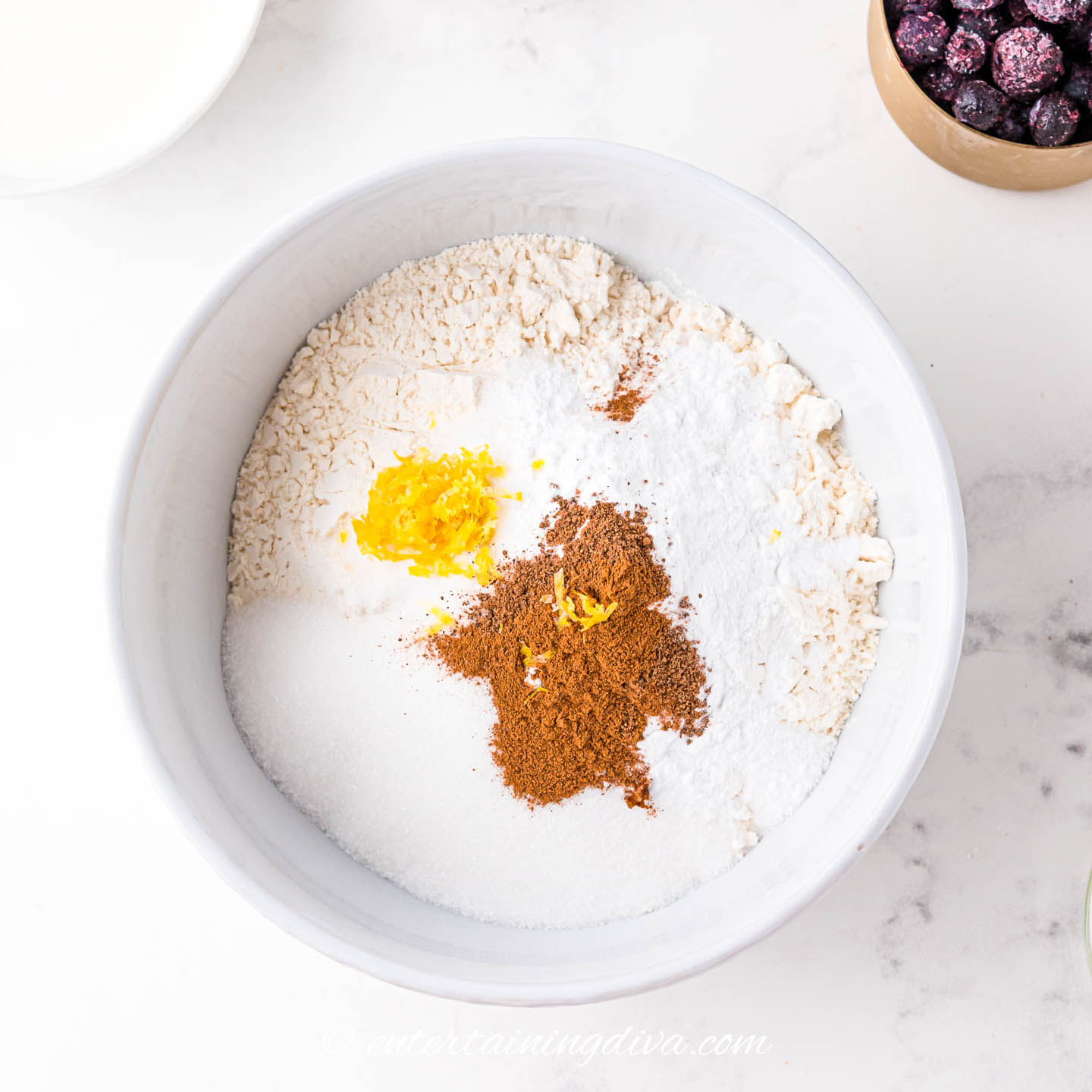
In a large mixing bowl, whisk together 2 cups flour, ½ cup sugar, 2½ teaspoons baking powder, ½ Tablespoon lemon zest, ½ teaspoon cinnamon, and ½ teaspoon nutmeg.
Since mixing the dough too much will result in tough scones, you’ll want to do this by hand, rather than using a mixer.
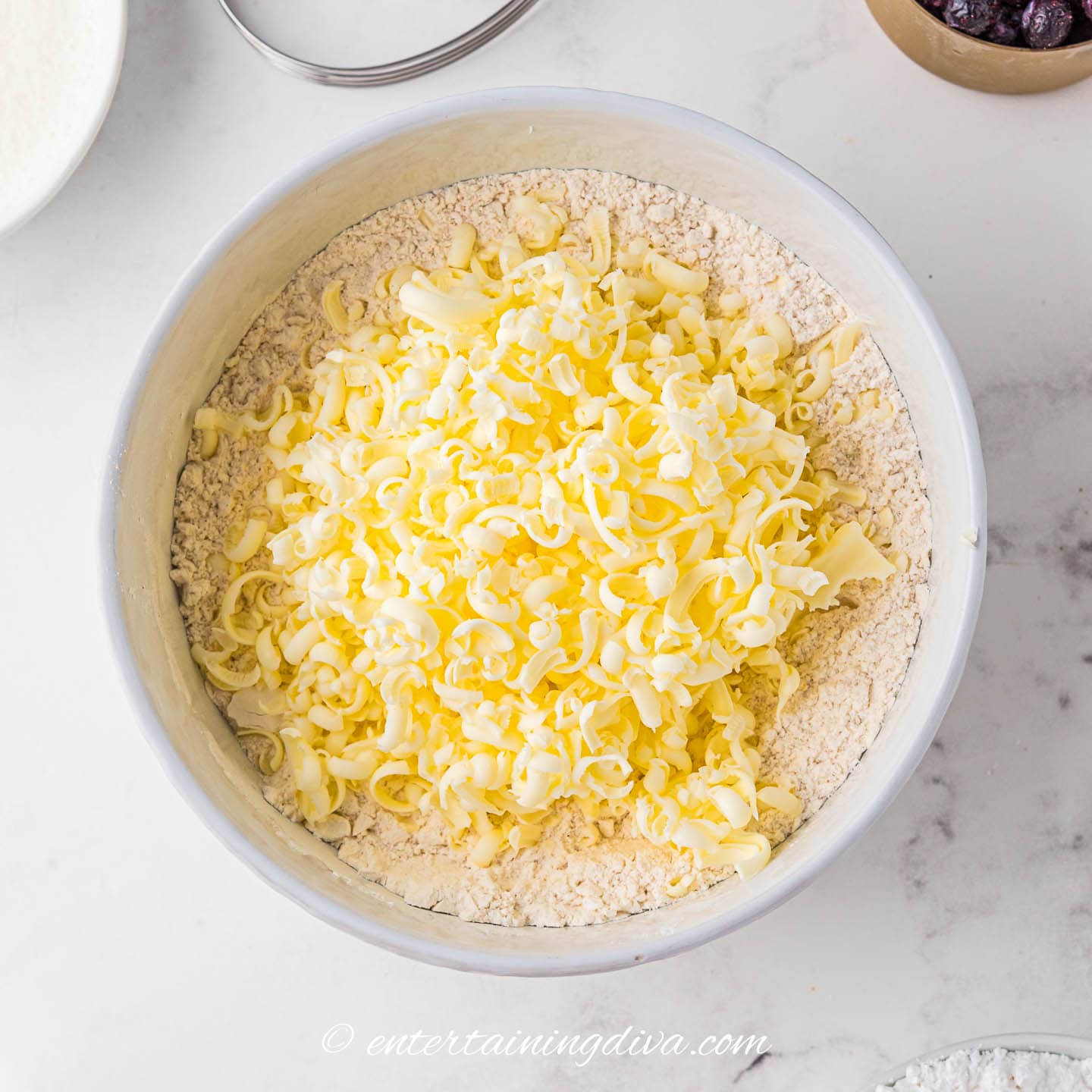
Using a grater, grate the frozen butter into the flour mixture.
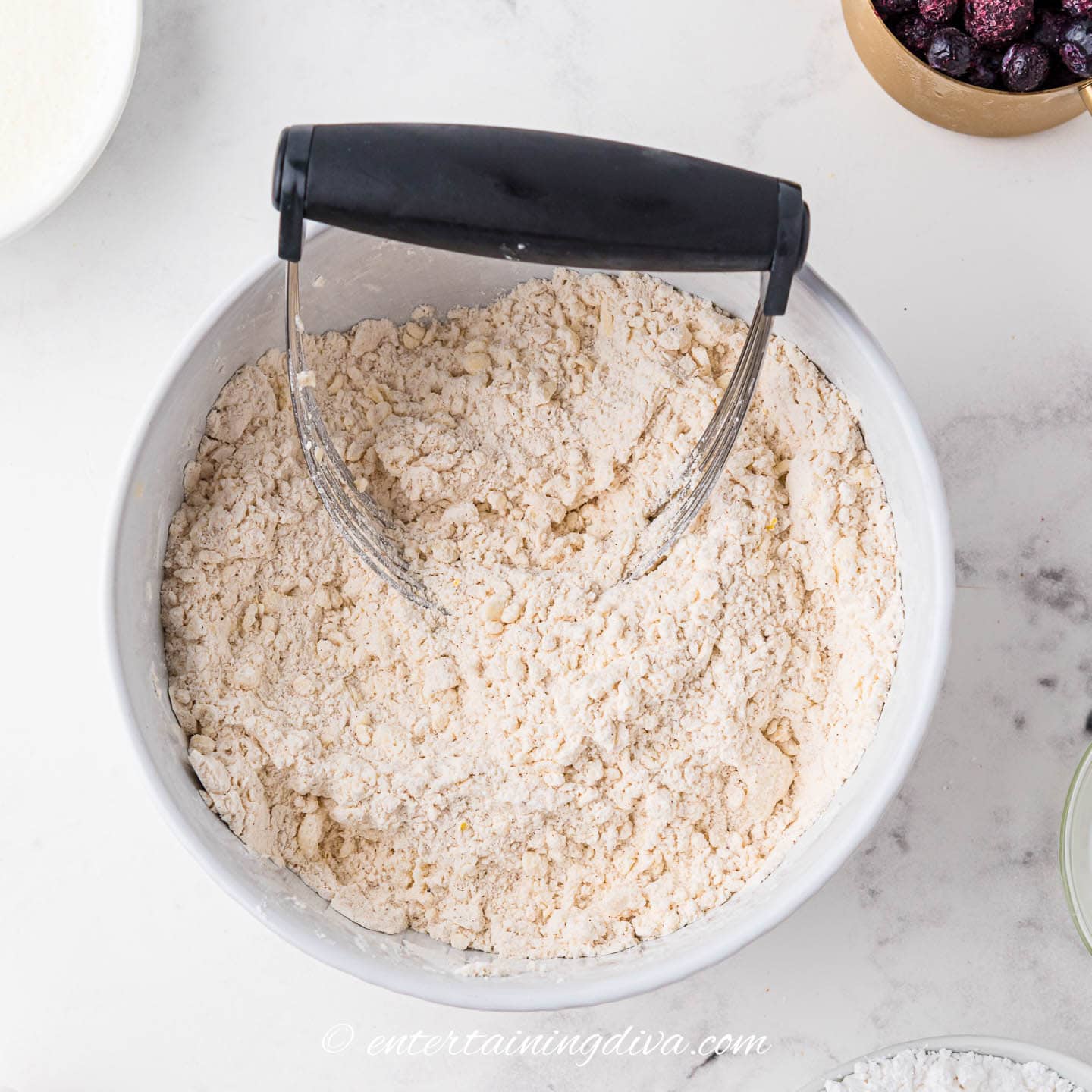
Use a pastry cutter to combine the butter and flour until the butter is cut up into small pieces that look like fine crumbs.
If you don’t have a pastry cutter, you can use two knives by crossing them and cutting through the flour and butter in an X-pattern. Repeat until the butter is chopped into small pieces.
Place the bowl back in the freezer while you mix the wet ingredients.
Combine the wet ingredients
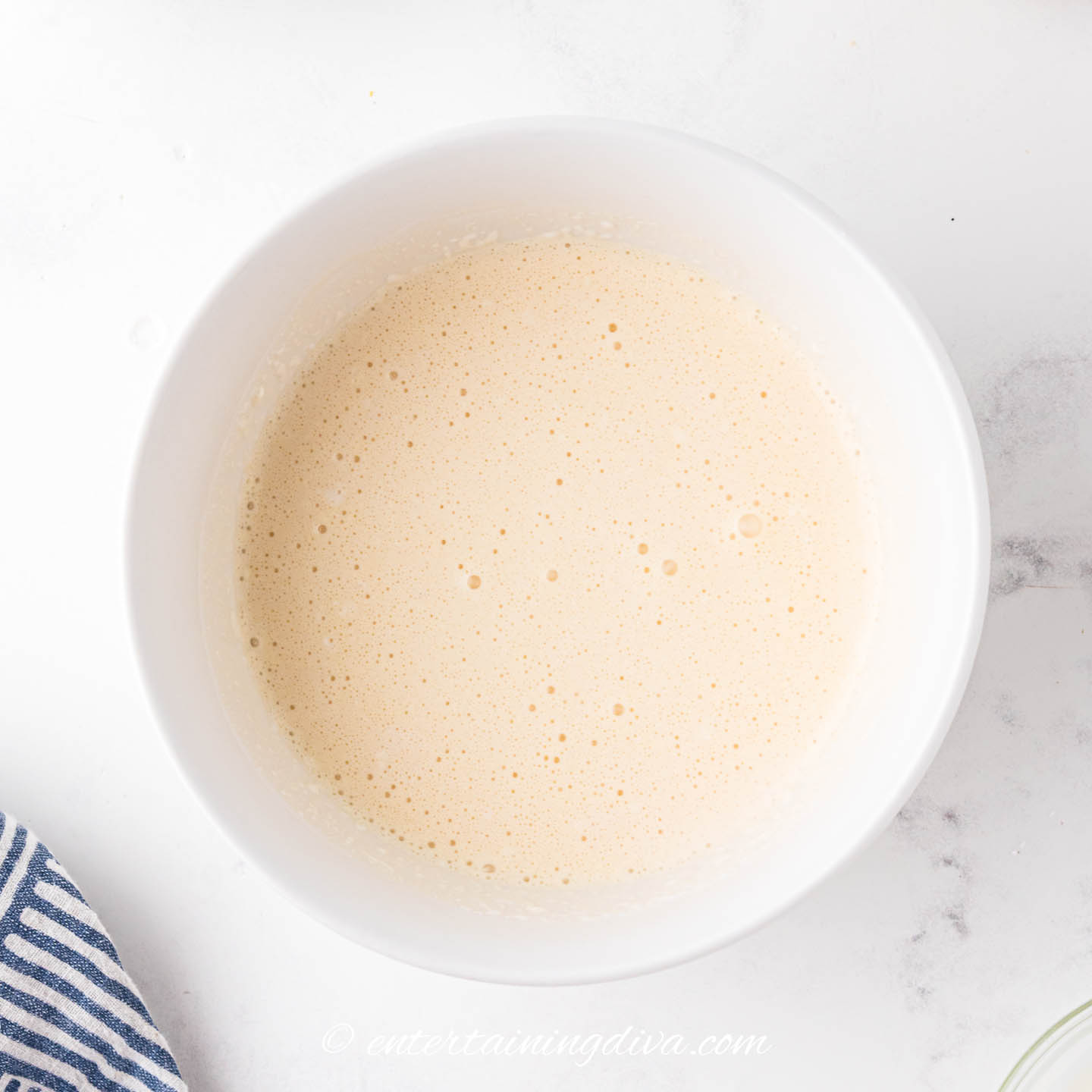
In a medium bowl, whisk together ½ cup heavy cream, 1 large egg, and 2 teaspoons vanilla extract.
Once wet ingredients are whisked together, remove the bowl with the dry ingredients from the freezer.
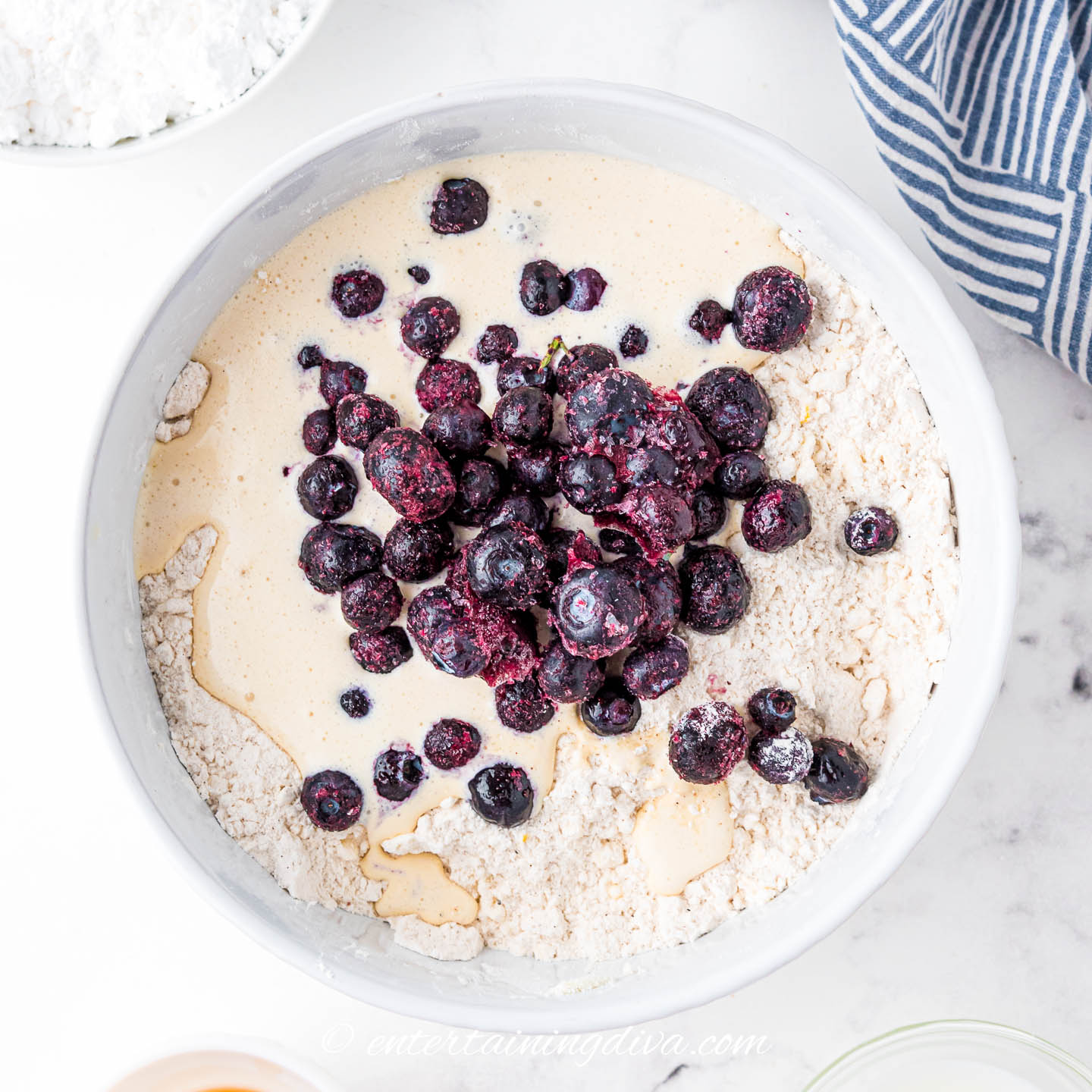
Pour the wet ingredients over the dry ingredients.
Then add the frozen blueberries (not thawed) and stir with a spoon just until everything is mixed. Again you don’t want to over-mix or you’ll end up with tough scones.
Make the scones
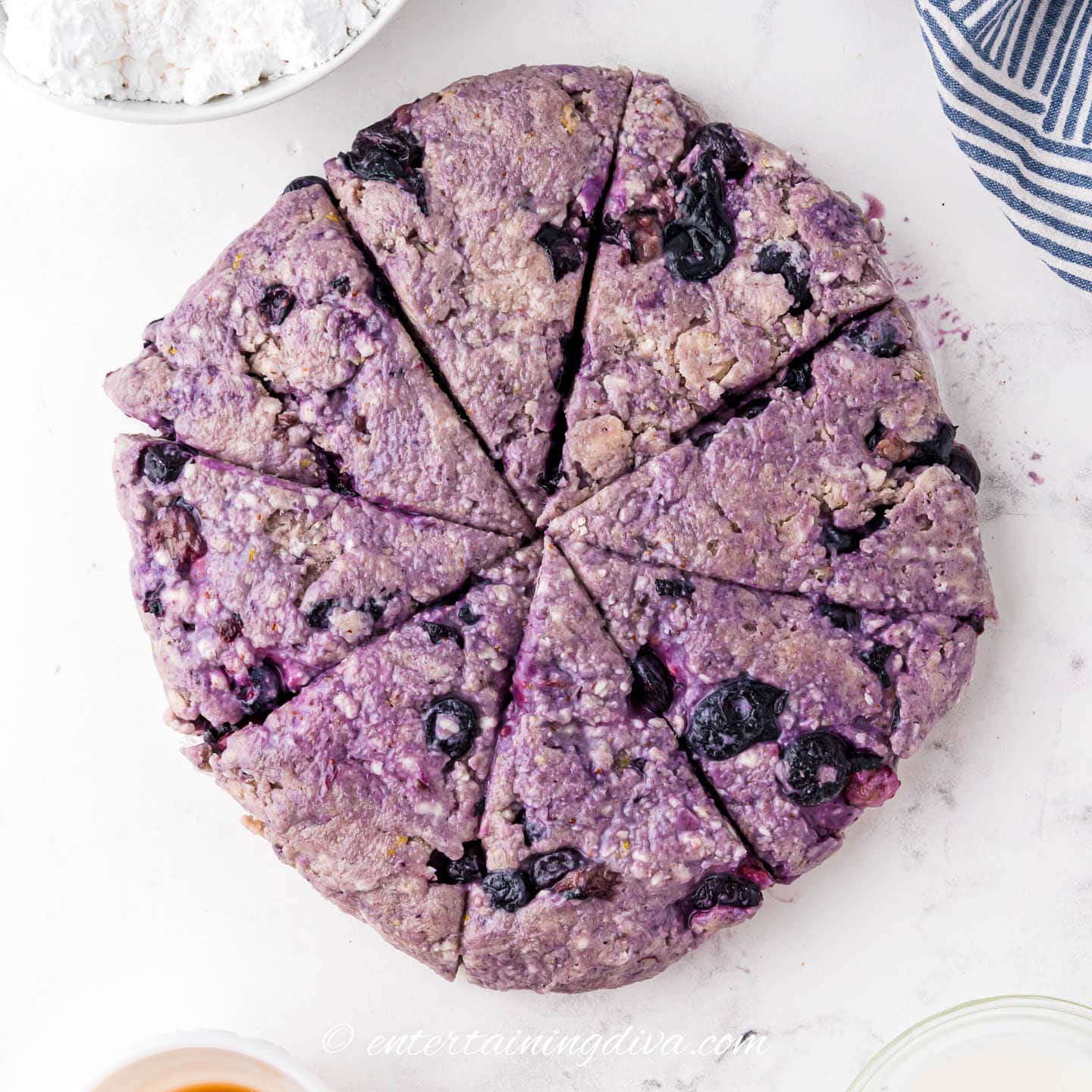
Spread a little flour on your countertop or a bread board, and on your hands.
Form the dough into a ball.
Then flatten it into an 8-inch disc on the floured countertop.
With a sharp knife, cut the disc in half lengthwise, then in half horizontally, then diagonally left to right and right to left, resulting in 8 wedges.
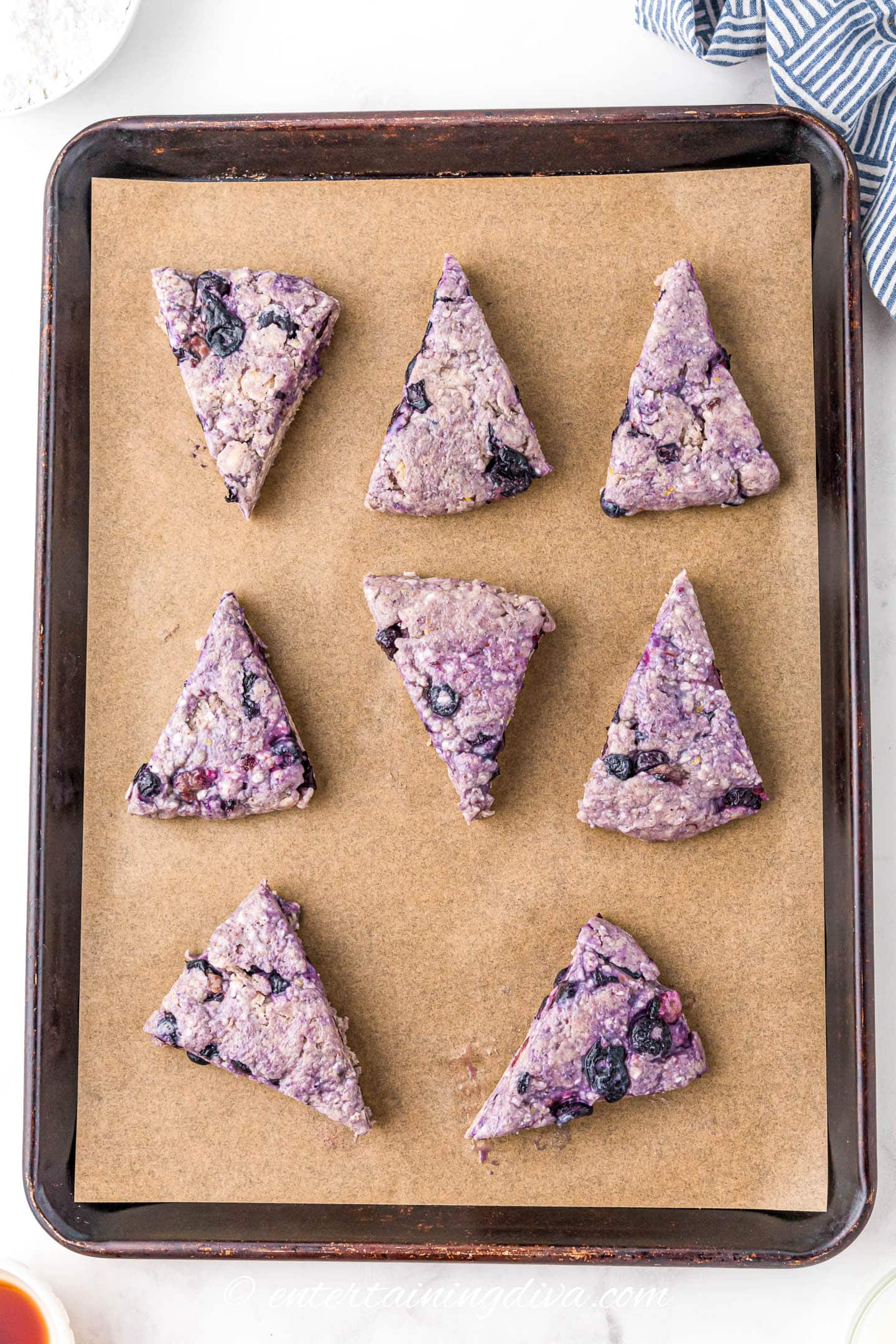
Place scones on the parchment-lined baking sheet, and refrigerate for 15 minutes.
Bake

While the scones are chilling, pre-heat the oven to 400℉.
When the oven is preheated, remove the scones from the refrigerator and bake for 18 to 20 minutes or until golden brown.
Remove from the oven, and allow to cool on a wire cooling rack.
Make the glaze

While the glaze is optional, it’s not hard to make. And it makes your scones look and taste a little special.
To make the glaze, whisk together 1 cup powdered sugar, 2 Tablespoons heavy cream, and 1 teaspoon vanilla
Drizzle over scones.
How to serve

As I mentioned above, scones are a must if you’re hosting a traditional tea party.
But I also love to serve them for brunch with either tea or coffee. Or even a mimosa. (Our lemon blueberry mimosas are perfect!)
And they go well with breakfast foods like bacon and eggs.
Storage
Scones can be stored at room temperature for up to 2 days or in the refrigerator for 5 days.
To reheat, microwave for 20 to 30 seconds on 50% power. This will prevent the dough from getting soggy.
They can also be frozen either before or after baking:
- Before baking: Make the scones and cut them. Then freeze the wedges for 1 hour on a baking sheet. Finally place them in a freezer-safe container. When you are ready to bake, thaw overnight and bake as stated in the recipe.
- After baking: Allow the scones to cool completely, and store in freezer safe container. Do not put the glaze on before freezing. When you are ready to serve them, thaw overnight in the refrigerator. Heat in the microwave for 30 seconds, and follow the instructions for icing.

Frequently asked questions
Why do you use frozen butter in scones?
Room temperature butter melts while you are mixing it which closes in the air pockets and makes the scones denser. Frozen butter prevents this so you end up with lighter, fluffier scones.
How to reheat scones?
The easiest way to reheat scones is in the microwave on 50% power for about 30 seconds. This prevents them from getting soggy in the process.
Can you freeze scones?
Yes, you can freeze scones either before or after you bake them. To freeze before baking, make them all the way up to cutting them. Freeze the wedges on a baking sheet for an hour, then transfer to an air tight container. To freeze after baking, cool them completely on a cooling rack before transferring to an air tight container (do not glaze them before freezing). In both cases, thaw them in the refrigerator overnight before reheating.
Other recipes you might like
- Traditional buttermilk scones
- Maple pecan scones with cinnamon butter
- Strawberry rhubarb bran muffins
- Banana nut bread with streusel topping

Glazed Lemon Blueberry Scones
Ingredients
Scones:
- 2 cups all-purpose flour
- ½ cup sugar
- 2½ teaspoons baking powder
- ½ Tablespoon lemon zest
- ½ teaspoon cinnamon
- ½ teaspoon nutmeg
- ½ cup salted butter frozen
- ½ cup heavy cream
- 1 large egg
- 2 teaspoons vanilla extract
- 1 cup fresh or frozen blueberries
Glaze:
- 1 cup powdered sugar
- 2 Tablespoons milk or heavy cream
- 1 teaspoon vanilla
Equipment
- 2 Mixing bowls
- measuring spoons and cups
- Whisk
- pastry cutter or 2 knives
- Baking sheet
- parchment paper, Silpat or non-stick cooking spray
- Cooling rack
- Small bowl
- mixing spoon
Instructions
Scones
- In a mixing bowl combine flour, sugar, baking powder, lemon zest, cinnamon, and nutmeg with a whisk.
- Using a grater, grate the frozen butter into the flour mixture.
- Using a pastry cutter, combine the butter and flour until it forms fine crumbs. Place in the freezer while you mix the wet ingredients.
- In a medium bowl whisk together cream, egg, and vanilla extract.
- Once wet ingredients are combined, remove dry ingredients from the freezer.
- Pour the wet ingredients over the dry ingredients.
- Add blueberries and stir together until everything is mixed.
- Using floured hands and a lightly floured surface, form dough into a ball.
- Then flatten it into an 8-inch disc.
- With a sharp knife cut the disc in half lengthwise, then in half horizontally, then diagonally left to right and right to left, resulting in 8 wedges.
- Place scones on a parchment-lined baking sheet, and refrigerate for 15 minutes.
- While the scones are in the refrigerator, preheat the oven to 400°F.
- When the oven is preheated, remove the scones from the refrigerator and bake for 18-20 minutes or until golden brown.
- Remove from oven, and allow to cool.
Glaze
- To make the glaze, whisk together powdered sugar, milk, and vanilla
- Drizzle over scones.
Notes
- Store in an airtight container at room temperature for 2 days or in the refrigerator for up to 5 days.
- Scones can be frozen either before or after baking for up to 2 months. To freeze before baking, freeze for an hour on a baking sheet after cutting into wedges. Then transfer to an airtight container. To freeze after baking, cool completely, then freeze in an airtight container. Do not glaze before freezing. In both cases, thaw before reheating.
- Reheat scones in the microwave on 50% power for 30 seconds.
Nutrition values are estimates only, using online calculators. Please verify using your own data.
This post was originally published on March 12, 2023 but was updated with new content on March 30, 2024.















